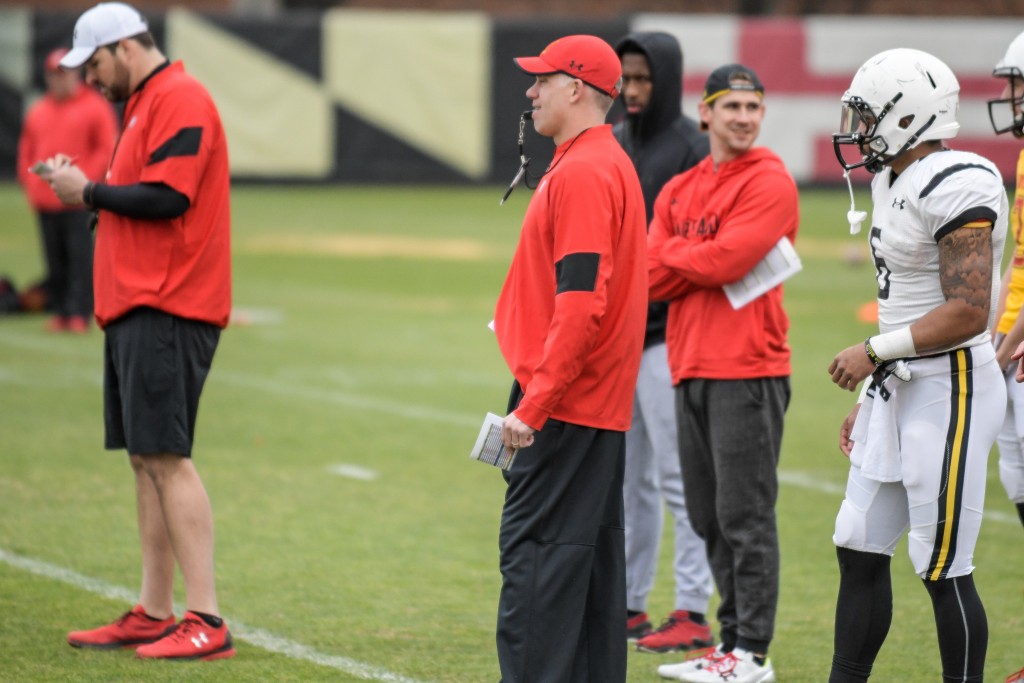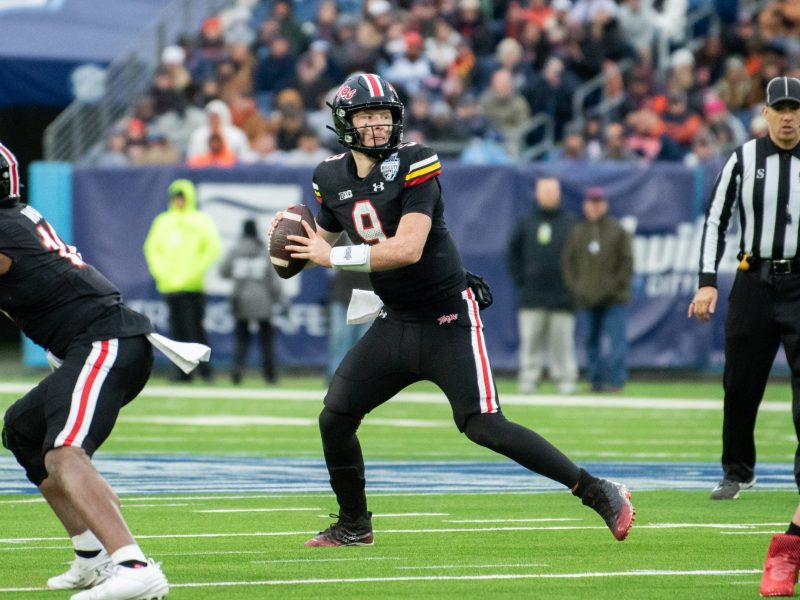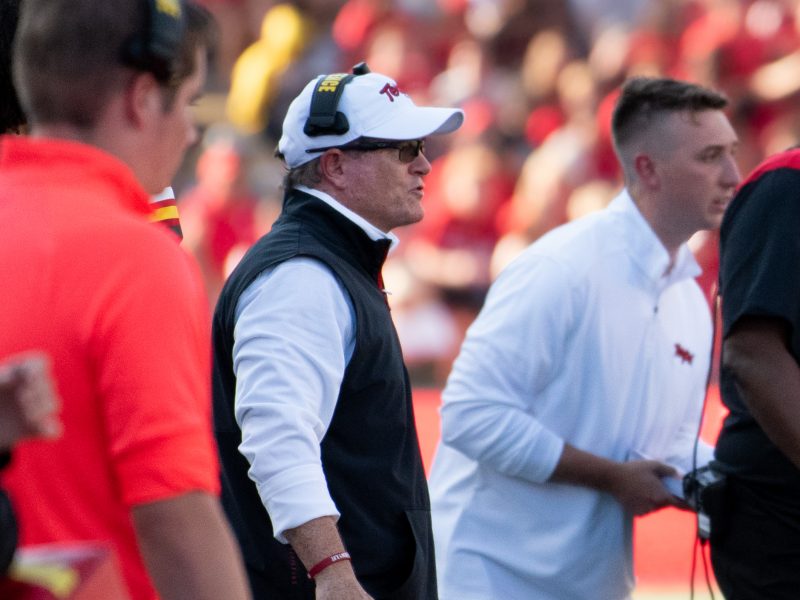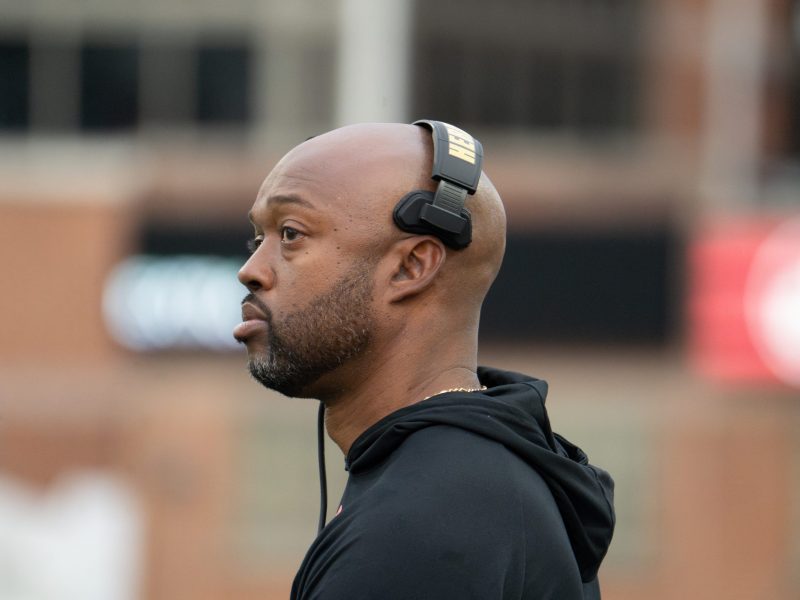In an ESPN article published Friday, several Maryland football players and staff members past and present described a toxic culture created by coach DJ Durkin and his staff.
The program has come under increased scrutiny following the death of offensive lineman Jordan McNair. The 19-year-old rising sophomore suffered heatstroke at a team workout May 29. He was taken to a hospital, where he died two weeks later.
Multiple sources told ESPN that Durkin, along with strength and conditioning coach and close confidant Rick Court, fostered a culture harmful to players, culminating in the events that led up to McNair’s death.
“I would never, ever, ever allow my child to be coached there,” a former Maryland staffer told ESPN.
On Friday, a university spokesperson said in a statement that members of the athletic staff had been placed on administrative leave, pending the results of an investigation on the team’s health and safety protocols. The statement did not specify which staffers, or how many, were placed on leave.
Among the allegations in the ESPN article: a player who said he was forced to overeat until he vomited as a punishment, harsh verbal belittling of players’ masculinity during workouts — including one player being mocked after he passed out — and a player who was aiming to lose weight being forced to eat candy bars while watching his teammates work out.
Malik Jones, a former Maryland defensive end who transferred to Toledo following the conclusion of the 2017 season, told ESPN that Durkin encouraged him to leave the program after Jones reportedly smiled during a team meeting.
“He basically got in my face, was pointing his finger in my face and calling me explicit names and things of that nature,” Jones said.
“We always talked about family, but whose family talks to you like that, calls you a pussy bitch?” a former staffer told ESPN. “There are so many instances.”
When asked at a journalism school event May 9 about the concussions and head trauma often linked with playing football, Durkin denied there was a link between concussions and CTE — citing an unreleased Department of Defense study — before extolling the virtues of playing football. He called it the “ultimate team sport” due to the values it instills in its players.
“[You learn] life lessons, that I don’t know where else they can be mimicked or translated in the same way,” Durkin said. “Our society is going in a direction where it’s the opposite of that. So where else does someone learn how to be a part of something bigger than themselves? How to be accountable to more than just yourself? How to take ownership of what’s going on?”
Multiple times since Maryland hired him in December 2015, Durkin has told reporters he intentionally scheduled practices during parts of the day when it was hottest.
“The heat makes cowards out of us all,” Durkin said in August 2016, according to the Carroll County Times. “We’re working on some mental toughness, and that’s what we’re going to do.
“We’re trying to make it as hard as we can.”
McNair collapsed after a set of 10 110-yard sprints at the May 29 workout. While several players who were there told ESPN that McNair couldn’t complete the workout without help or stand on his own when he was done, they said the culture of the team made him — and other players — feel pressured to finish the workout.
“Jordan knew that if he stopped, they would challenge his manhood, he would be targeted,” a current player said. “He had to go until he couldn’t.”
Former Maryland safety J.T. Ventura told ESPN that the staff — chiefly Court — “bullied us to make sure we kept on going.”
“If a kid would stop or go on the ground, him and the medical staff would try to drag players up and get them to run after they’d already reached their limit,” Ventura said.
And during the 10th rep of McNair’s final practice, when he reportedly was unable to move under his own power, witnesses said they heard Maryland head football trainer Wes Robinson yell, “Drag his ass across the field!”
Robinson, who also served under former Maryland coaches Ralph Friedgen and Randy Edsall, was “meek and mild-mannered” prior to Durkin’s tenure, according to a former staffer that worked with him.
“I’m sure he probably felt a certain amount of pressure from D.J. I think most trainers probably do, but I think Wes may have morphed into a personality that he’s really not,” another former staffer told ESPN. “It did seem like he was trying to become someone he really wasn’t.”
One player described Court as “a ball of testosterone all the time,” who would single out players he didn’t like and force them to work out strenuously. The player described Court as “Durkin’s tool” in making players’ lives miserable.
Court was one of Durkin’s first additions to his coaching staff, and Durkin’s first phone call after he was hired by Maryland, according to The Washington Post.
And several players and staffers have alleged a vicious cycle of verbal abuse, often with individual players singled out in front of the team — to the point where everyone became numb to the attacks, a staffer said.
This callousness persisted after McNair’s death, players told ESPN. After McNair died, Maryland coaches reportedly had a meeting with players, listening to their concerns in the wake of their teammate’s death.
But while the intensity lessened during the remainder of the summer, players said it returned with the beginning of training camp on August 3.
“Now that we get to camp, it just seems like regular business,” an unnamed player told ESPN. “That’s when I started to get upset because I feel like nothing’s really changed. Have these guys learned their lesson?”
The Maryland athletics department hired Walters Inc., an athletics consulting firm, to conduct a review of the team’s protocols in the wake of McNair’s death. A final report is expected Sept. 15.
Yet players alleged that the meetings with investigators, intended to be anonymous, were brief and unhelpful, and organized via a sign-up sheet outside assistant athletic director Jason Baisden’s office — allowing coaches to see who was being interviewed. Interviews reportedly took place in the Gossett Football Team House, near Durkin’s office.
“Basically anybody can walk by, any coach or whoever really wants to can walk by and see who signed up and see who’s talking to the investigation,” a current player said. “They’re singling us out even more when it’s supposed to be an anonymous investigation.”
University officials told ESPN that players had the opportunity to sign up for the meetings anonymously. The investigators are expected to return to College Park next week.
“There were multiple ways student-athletes could volunteer participation in the external review, including confidentially meeting with consultants to offer information without being identified,” university spokesperson Katie Lawson said.
McNair’s family has hired Baltimore law firm Murphy, Falcon & Murphy to investigate the matter. Billy Murphy, the firm’s lead attorney, has been an outspoken critic of the “macho culture” persisting in the program.
“My job is to be suspicious of institutional reactions to personal injuries that could cost them a lot of money to fairly compensate, and that’s how I feel here,” Murphy said in July. “I’m very suspicious that they will do what is necessary and say what is necessary to avoid responsibility for this injury.”
In a letter sent to parents of Maryland football players prior to the ESPN report, Durkin wrote that the last few months have been “very difficult for our program,” The Baltimore Sun reported. The letter informed the parents of the ESPN report and said the team wants “to keep the lines of communication open.”
“Our priority every day is the safety along with the academic, personal and athletic development of your sons,” he wrote. “During this time of healing, our focus needs to be on each other and unity within our program.”
On Thursday, a university spokesperson said that the team had closed Friday’s practice to media, after it was expected to be the team’s first open practice of the fall.
Senior staff writer James Crabtree-Hannigan contributed to this report.
This article has been updated.



